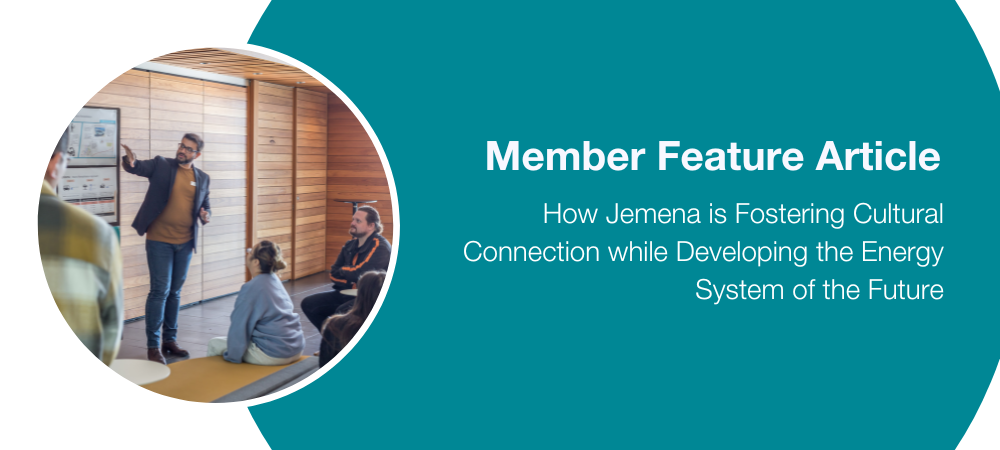How Jemena is Fostering Cultural Connection while Developing the Energy System of the Future

With Jemena Gas Networks.
The Jemena Gas Networks 2050 Price Reset project is key when planning for how the energy transition will occur and what the future role of gas will be. Covering 2025 – 2030, the Price Reset project culminates with Jemena submitting a plan to the Australian Energy Regulator (AER) for the five-year period. To develop the plan Jemena – a leading energy infrastructure company – works closely with a range of stakeholders, customers, and key voices in the community.
The Jemena gas network can be traced back to 1837 when it was created to power Sydney’s streetlights using gas. Fast forward 185 years and today Jemena is the largest gas distributor in New South Wales. Jemena’s network connects gas from major points of supply to residential, business, and industrial sites in Sydney, Newcastle, the Central Coast and Wollongong along with over 20 regional centres across New South Wales.
Australia is moving rapidly to reach net-zero carbon emissions by 2050 – a target mandated in legislation and policy at both the state and federal level. The transition of the gas sector, what it looks like and the role it plays in the future, will be influenced by customers, technology, and policy. The Jemena Gas Networks 2050 Price Reset saw Jemena consult with key stakeholders, customers, and key voices to ensure their views on the future of the gas network are heard and reflected in Jemena’s future plans for the network.
Speaking about the challenge, Ana Dijanosic, General Manager Regulation said: “Jemena is at a really important time in its history. We’ve got lots of really challenging issues to face into, as we think about what role our network will play over the next 20 to 30 years. Our whole energy system is decarbonising as we move towards a net-zero future.”
“A lot of the choices that we have to make involve trade-offs and they’ll impact customers not only today but into the future. So, it’s really important that when we’re thinking about these issues and challenges, that we engage with our customers to get their views on what we should be doing.”
One such voice comes from Jemena’s Culturally and Linguistically Diverse (CALD) participants, including educators from the Ethnic Communities Council of NSW, who represent different communities – including Arabic / Assyrian, Tamil, Nepali and Vietnamese communities. Throughout the engagement process, Jemena asked them to share their ideas and preferences on gas and energy.
“Without gas, Indian cooking cannot be done! [For these communities] it is an essential service […] that’s why we are concerned about the availability and affordability of gas.” Mani Ramasamy said.
Through in-depth engagement with these communities, Jemena was able to better understand their cultural connection to cooking with gas and how it brings families together. Indian families, gather together when cooking – sometimes for hours – as they share their stories and prepare the meal that they will then eat together.
Kate, a Jemena Customer commented: “It wouldn’t impact me personally, only cooking using electricity, but hearing from other people that their particular culture’s food needs to be cooked on gas, was an important viewpoint I hadn’t considered.”
When thinking about the future of gas and renewable gas options, our customers were very positive.
“I’m really excited to see the way that they’re developing new renewable gases like biomethane and hydrogen.” Fida Al Haddad, Ethic Communities Council of NSW, said.
Victoria, a Jemena customer said: “It sounds like biomethane is a good option because it captures the emissions from already existing waste. It’s more of a sort of circular environmentally friendly option.”
The Malabar Biomethane Demonstration Project, co-funded by Jemena and the Australian Renewable Energy Agency (ARENA), is creating biomethane by upgrading biogas produced from organic waste. The project is a partnership with Sydney Water and is being housed at the Malabar Wastewater Resource Recovery Plant. The plant effectively turns wastewater, including human waste, into gas that you can cook with!
The Malabar Biomethane Demonstration Plant will initially produce around 95 terajoules of renewable gas each year – the equivalent of the average yearly use of around 6,300 homes.
Through the process information sharing, listening, and in-depth discussion with our customers, we have been able to demonstrate the importance of gas usage in the future, particularly with our CALD Group. This has led to an informed and engaged customer cohort who are excited about the potential role that renewable gas can play as we move towards net zero.
Our customers made several recommendations in the Gas Networks 2050 Forum Seven held in Sydney recently, which included:
- Jemena needs to have more public presence in the media.
- Speak with the Federal and local government and councils about Renewable gas advocacy and planning for the future.
- Educate all stakeholders to ultimately reduce the numbers of customers leaving gas over safety concerns. Recognising everyone’s knowledge varies, supply more information so there isn’t any misinformation when educating everyone.
- To communicate with their customers on the future of renewable gas with a personable approach, so that customers don’t abandon the company. This could include cost comparison between electricity and gas.
- Communicate that the option of biomethane is an environmentally friendly solution.
To find out more about Jemena Gas Networks 2050, visit https://yournetwork.jemena.com.au/
To find out more about our Biomethane project, visit https://jemena.com.au/about/newsroom/media-release/2023/biomethane-injected-into-gas-grid-in-australian-fi
